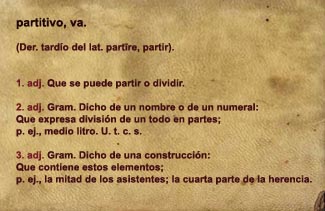Syntax and nature of partitives

In Chapter 1 the properties of partitives are described and discussed in light of previous analyses and data (mainly from Catalan but also from other languages, especially Romance and Germanic languages) and a line of explanation is suggested.
In Chapter 2 two constructions that have been considered as partitives in the literature are thoroughly studied, given that they look very similar, and it is solidly argued that they are in fact quantitatives. These are nominals in which the quantifier is followed by a noun as in dos llibres d'aquells ('two books of those') and indefinite nominals that express partition through the preposition entre ('among'), such as una novel·la d'entre els llibres que em vas deixar ('a novel among the books you lent me'). The conclusions in this chapter are very relevant for the analysis defended here: partitives have a single-noun structure and only the preposition de (and not entre) forms partitives.
In Chapter 3 a unitary analysis for partitives and quantitatives is presented and defended according to which quantifiers are lexical elements that select a noun (projected into a Determiner Phrase (DP) in partitives or a Noun Phrase (NP) in quantitatives) and that are generated in a low position in the nominal structure. The preposition de has the same status and role in partitives and in quantitatives (una mica de pa 'a bit of bread', molts de dies 'many days'): it is a functional category that licenses the noun. The quantifier moves to the left just as it does in other cases of inversion in nominals (e.g. qualitative predicate inversion as in l'idiota d'en Joan 'the idiot of Joan'). The advantage of this analysis is that the same basic structure accounts as well for predicational uses of quantifiers in the clausal domain —as predicates in copular sentences (Els meus estudiants són molts 'My students are many') and as secondary predicates (Els colons arribaven a milers 'Colonists arrived by the thousand')— or even within nominals such as nosaltres dos 'we two' or els tres llibres 'the three books'. The differences among all these constructions derive mainly from the lexical features quantifiers have and from the type of nominal projection they select (NP or DP).
References
"The Syntax of Partitives". PhD Thesis defended by Núria Martí i Girbau. Director: Ana Bartra Kaufmann.


